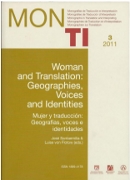English translation of the Quran by women: the challenges of “gender balance” in and through language
Contenido principal del artículo
Resumen
Descargas
Detalles del artículo
La propiedad intelectual de los artículos pertenece a los autores y los derechos de edición y publicación, a la revista. Los artículos publicados en la revista podrán ser usados libremente para propósitos educativos y científicos, siempre y cuando se realice una correcta citación del mismo. Cualquier uso comercial queda expresamente penado por la ley.
Citas
Arberry, John Arthur. (1955) The Koran Interpreted. London: Allen & Unwin.
Bakhtiar, Laleh. (2007) The Sublime Quran. Kazi Publications.
Barlas, Asma. (2002) “Believing Women” in Islam: unreading patriarchal interpretations of the Quran. Austin, TX: University of Texas Press.
Bird, Phyllis A. (1988) “Translating Sexist Language as a Theological and Cultural Problem.” Union Seminary Quarterly Review 42:1. pp 89-95.
Cameron, Deborah. (1985) Feminism and Linguistic Theory. London: Macmillan.
Daly, Mary. (1974) Beyond God the Father: toward a philosophy of women’s liberation. Boston: Beacon Press.
De Lotbinière-Harwood, Susanne. (1990) Letters from Another. Toronto: Women’s Press.
Elgin, Suzette Haden. (2000) Native Tongue. New York : Feminist Press.
Fakhry, Majid. (1997) The Qur’an: a Modern English Version. Reading: Garnet.
Helminski, Camille Adams. (2000) The Light of Dawn: Daily Readings from the Holy Qur’an. Boston: A Shambhala Threshold Book.
Hervey, Sándor; Ian Higgins & Louise Haywood. (2008) Thinking Spanish Translation: a Course in Translation Method, Spanish to English. London: Routledge.
Jakobson, Roman. (1959) “On linguistic aspects of translation”. In: Brower, R. (ed.) On Translation. Cambridge MA: Harvard University Press.
Lakoff, Robin. (1975) Language and Woman’s Place. New York: Harper & Row.
Livia, Anna. (2001) Pronoun Envy: Literary Uses of Linguistic Gender. Oxford: Oxford University Press.
Miller, Casey & Kate Swift. (1977) Words and Women. Garden City, N.Y: Doubleday/Anchor.
Plaskow, Judith. (1990) Standing Again at Sinai: Judaism from a Feminist Perspective. San Francisco: Harper & Row.
Poythress, Vern S. & Wayne A. Grudem. (2000) The Gender-Neutral Bible Controversy: Muting the Masculinity of God’s Words. Broadman & Holman Publishers.
Sadiqi, Fatima. (2003) Women, Gender and Language in Morocco. Leiden and Boston: Brill.
Saffarzadeh, Tahereh. (2006) The Holy Quran: Translation with Commentary. Tehran: Alhoda.
Saheeh International. (1997) The Quran, Arabic Text with Corresponding English Meaning Riyadh: Abulqasim Publishing House.
Sells, Michael. (1999) Approaching the Qur’an: the Early Revelations. Ashland, OR: White Cloud Press.
Simon, Sherry. (1996) Gender in Translation: Cultural Identity and the Politics of Transmission. London: Routledge.
Spender, Dale. (1980) Man Made Language. London: Pandora.
Strauss, Mark. (1998) Distorting Scripture? The Challenge of Bible Translation & Gender Accuracy. Downers Grove, IL: InterVarsity.
Von Flotow, Luise. (1997) Translation and Gender: Translating in the “Era of Feminism.” Manchester: St. Jerome.
Von Flotow, Luise. (1991) “Feminist Translation: Contexts, Practices, Theories.” TTR: Traduction Terminologie Rédaction 4(2). pp 69-84.
Zeidan, Joseph. (1995) Arab Women Novelists: the formative years and beyond. Albany: State University of New York Press.


